Are you tired of fighting aggressive weeds that threaten your lawn and garden? Want a chemical-free weed management method?
This blog post will arm you with tried-and-true techniques to defeat those annoying intruders without compromising your dedication to a healthy, sustainable landscape.
Weeds grow overnight, suffocating our beloved plants and stealing the show from our carefully groomed lawns. Chemical weed killers promise a quick fix but often hurt the ecosystem, beneficial creatures, and even us.
Natural weed control helps. Preventive measures, interventions, and resourcefulness can help you reclaim your outdoor area while being more environmentally friendly.
Let's discover the secrets to a lush, weed-free environment that will inspire you and make your neighbors jealous!
20 Tips to Control Weeds Naturally:
Bid farewell to those endless battles against weeds, and join us on this adventure to create a garden that radiates beauty, balance, and natural harmony. Together, we'll embrace the bountiful offerings of nature and cultivate a weed-free oasis using natural weed killers.
1. Mulch:
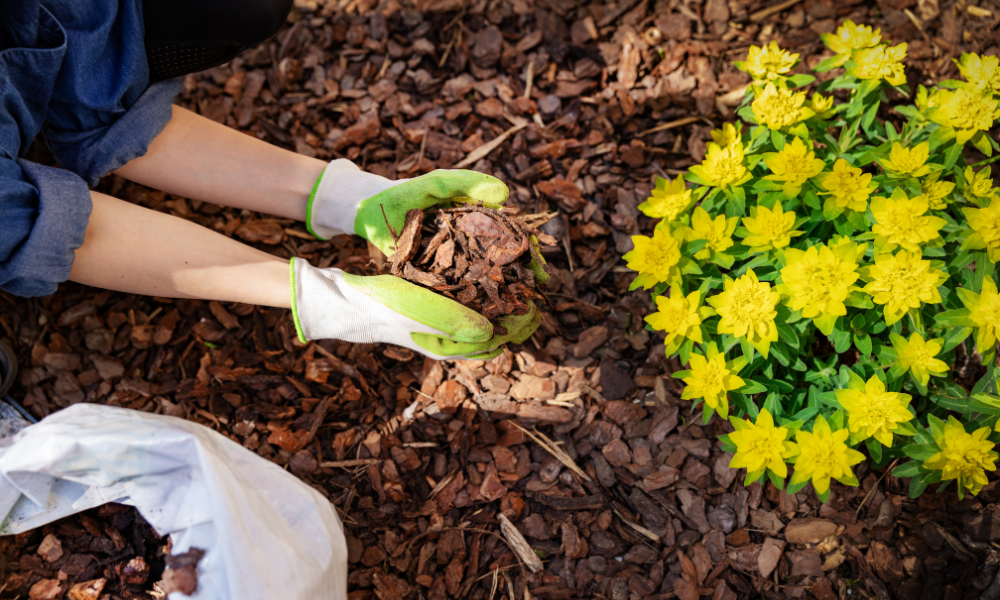
Mulch is an organic weed control perfect for your gardens and landscaping. Cover garden and lawn weeds with mulch. It can suffocate weeds and prevent them from competing with your plants. Organic mulches improve soil quality by decomposing and adding organic matter, thus giving your plants nutrient to combat weeds.
Apply a layer of organic mulch wood chips, straw, leaves, grass clippings, compost, gravel, stones to bare ground to suppress weed growth.
2. Hand-pull weeds:
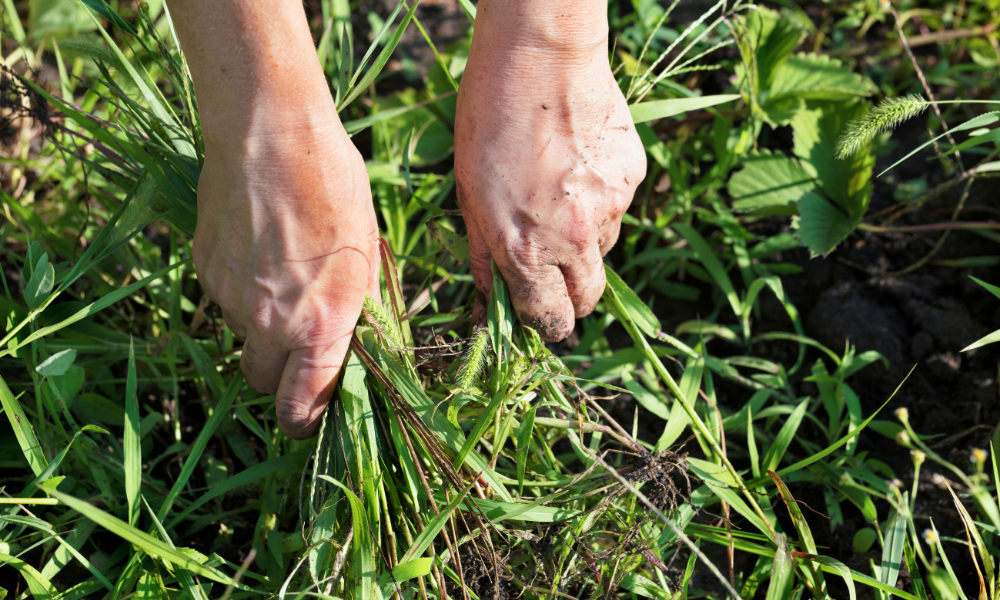
Regularly inspect your garden and manually remove weeds by pulling them out from the root. Inspecting your garden for weeds and remove them promptly before they have a chance to spread and set seeds.
Hand pulling is very effective in controlling broadleaf weeds, it ensures you remove the entire plant and root system to prevent regrowth. Remember to put your garden gloves on to protect your delicate skin from cuts and harmful insects.
3. Use of weeding tools:
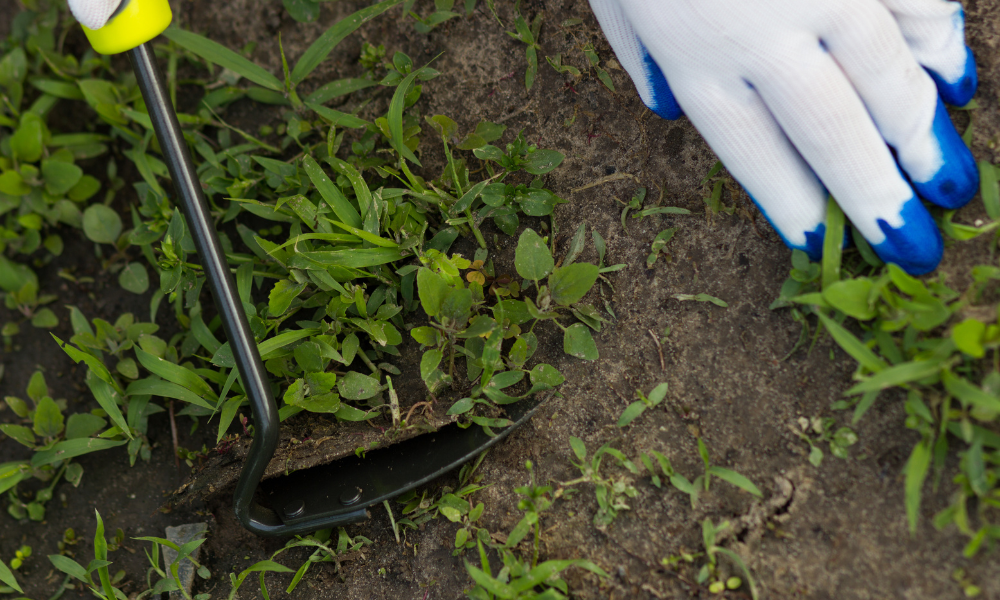
Weeding tools are the secret to chemical-free, precise, and efficient way to remove weeds. The hand trowel and garden fork help you remove weeds. The weed puller attacks weeds that are deep-rooted. It entails hoeing and cutting weeds at their roots. The weeding hoe can handle greater regions, shallow-rooted weeds, or warm-season grasses. Each gadget helps you completely clear weeds.
Getting rid of weeds will reveal your green thumb. This method is perfect for broadleaf, lawn weeds, perennial grasses, and annual weeds. Use these wedding tools to restore your garden's attractiveness.
4. Practice crop rotation:
Crop rotation naturally controls weeds. Crop rotation interrupts the cycle of crop-related pests and diseases that promote weed growth. It also improves soil health, preventing weeds. Crop rotation should be supplemented with other weed management methods to be effective.
5. Use Thick Weed Barrier:
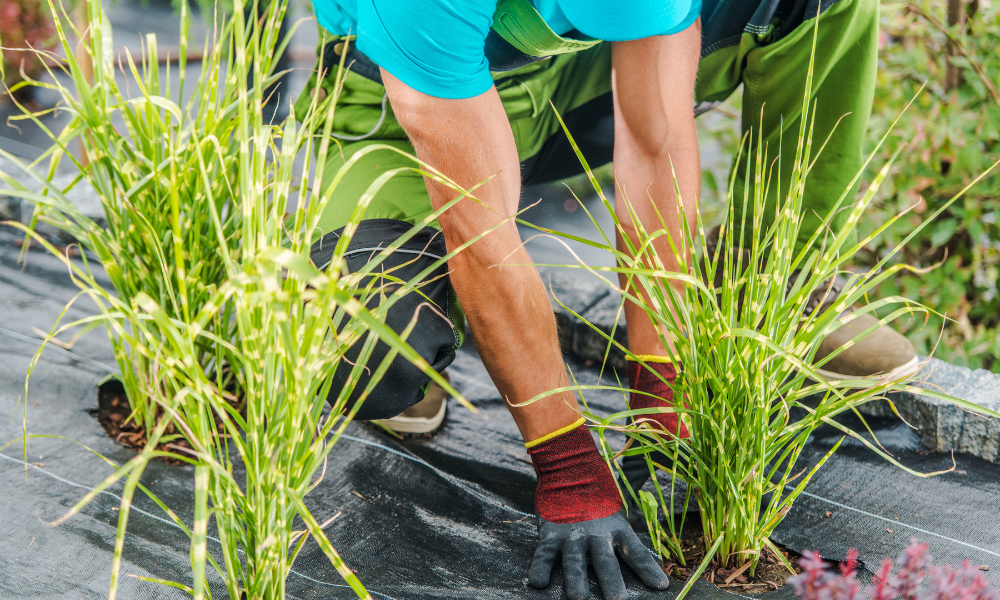
Thick weed barrier controls weeds naturally. It prevents weed seeds from sprouting and reduces the need for human weeding. Landscape fabric suppresses weeds and absorbs nutrients, enabling healthy development.
This weed killer is easy to install control, remember leave some overlap. If you're placing the cloth around existing plants or planting new ones, cut X- or slit-shaped holes for the plants. Make holes big enough for plants to develop.
Cover the soil's surface with weed barrier cloth. Use landscape fabric staples or anchor pins to hold the cloth, especially around corners. To secure fabric, staple or pin every few feet. In windy conditions, anchor the cloth with rocks, bricks, or other heavy objects along its edges.
6. Use garden edging:
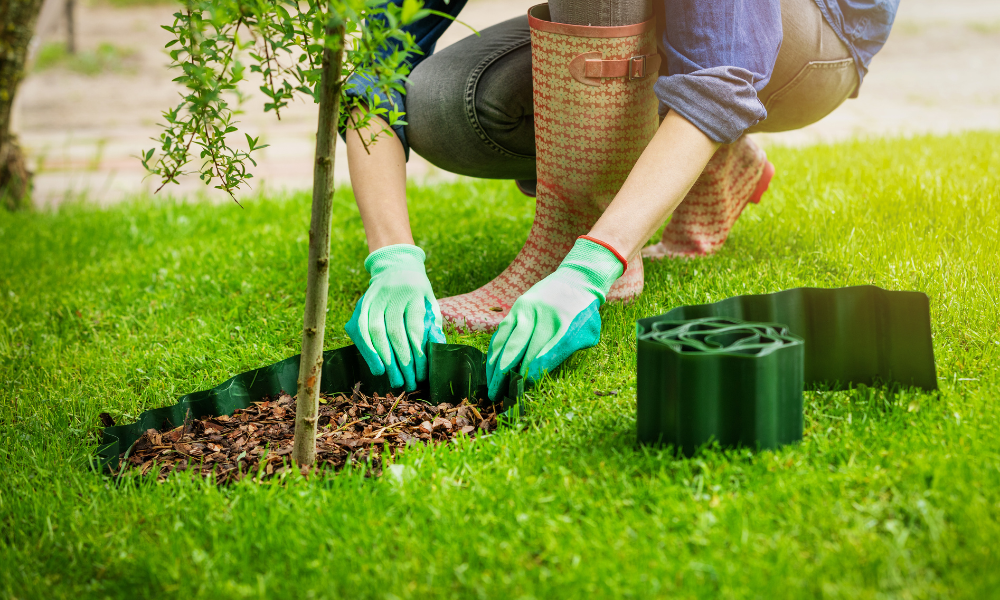
Garden edging naturally controls weeds. Edging protects your garden beds from weeds and decreases competition for resources. Natural landscape edging possibilities include stone, brick, wood, plastic, metal, mulch, and gravel.
These materials repel weeds and beautify your garden. Maintain a weed-free, attractive landscape with garden edging and regular care.
7. Maintain healthy soil:
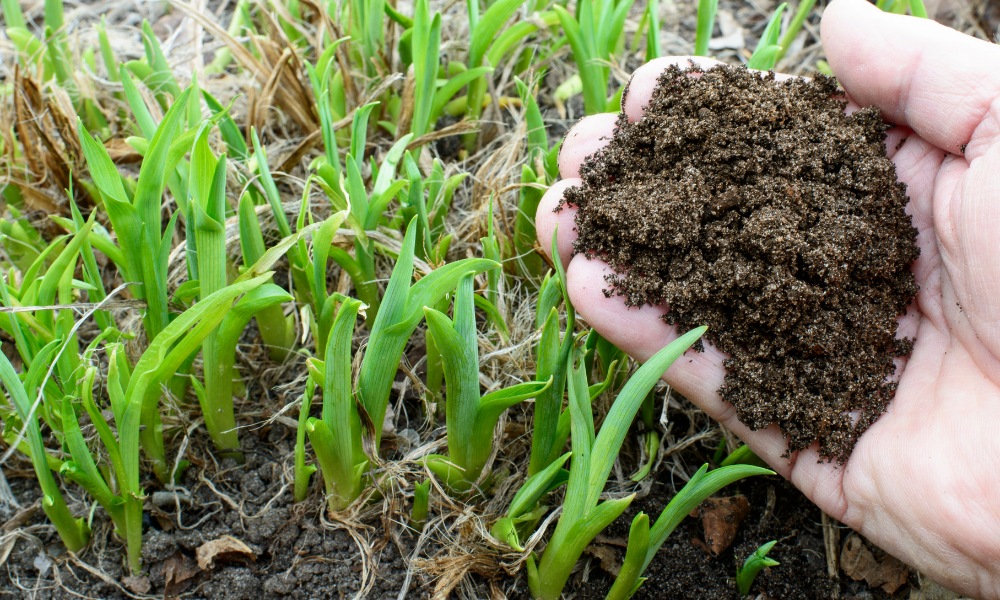
Ensure proper soil nutrition and pH levels, as healthy plants in nutrient-rich soil are better equipped to compete with weeds. Keep your soil healthy and fertile by adding soil enhancers and amendments, compost or organic matter regularly. Healthy soil promotes strong plants that can better compete with emerging weeds.
8. Hand weed before seeding or planting:
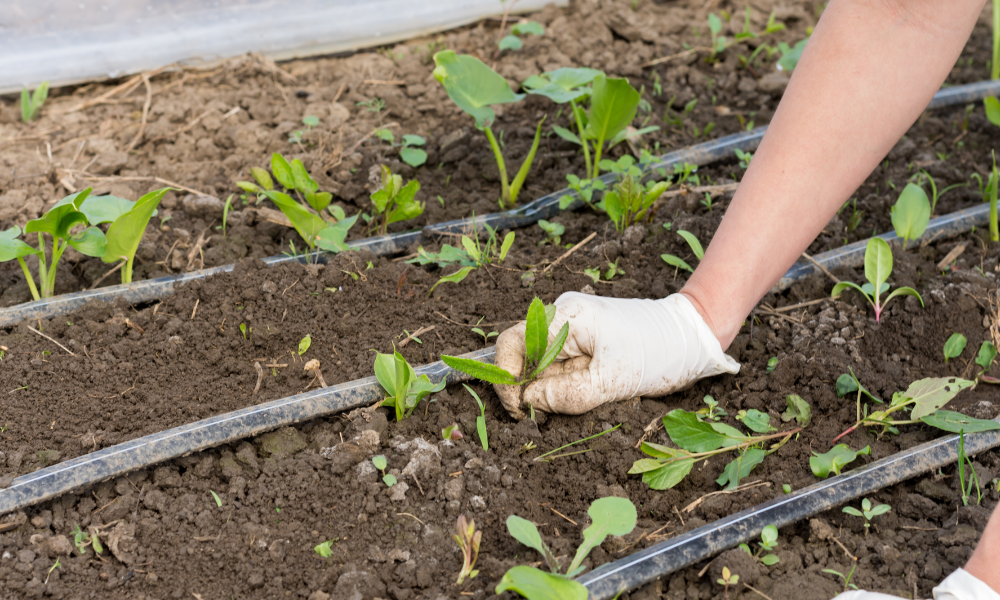
Hand weeding before seeding or planting is natural and effective way to kill weeds. Manually eliminating weeds lets you target specific plants without harming others.
Hand-pulling weeds eliminates their foliage and roots, inhibiting regrowth. However, this weed killer method is time-consuming and impractical for large areas. It is ideal to kill weeds in a smaller using this effective weed control. Remember hand weeding is accurate and eco-friendly. You can select the unwanted plants that are competing with your crops.
9. DIY weed control solutions:

Vinegar and salt suppress weeds naturally. White vinegar, which contains herbicidal acetic acid and salt, dehydrates plants and makes a potent weed killer. Mix a gallon of white vinegar with 1 cup of salt and liquid dish soap to stick to the weeds. Avoiding desirable plants, spray the liquid directly onto undesirable plant leaves and stems.
This procedure is effective yet non-selective and can damage nearby vegetation. Thus, it should be applied sparingly to remove all vegetation or weeds. Weeds may require repeated applications.
Baking soda is a natural and inexpensive weed killer. Baking soda increases soil pH, making it effective crabgrass killer and even dandelion. Apply a spoonful of baking soda and water to leaf surface and stems, taking care not to injure valuable plants. Results may require multiple applications. However, baking soda can alter soil pH and kill other plants. Thus knowing your enemy is very important.
10. Corn gluten meal:
Corn gluten meal controls weeds organically. It is a pre-emergent herbicide made from maize milling byproducts. It targets many broadleaf weeds, but may not work on grassy ones. Watering corn gluten meal in early spring or fall before weed seeds sprout can limit weed growth. Corn gluten meal limits plant growth uniformly. When applied properly, it reduces weeds while keeping a natural gardening and landscaping approach.
11. Pull weeds after rain:
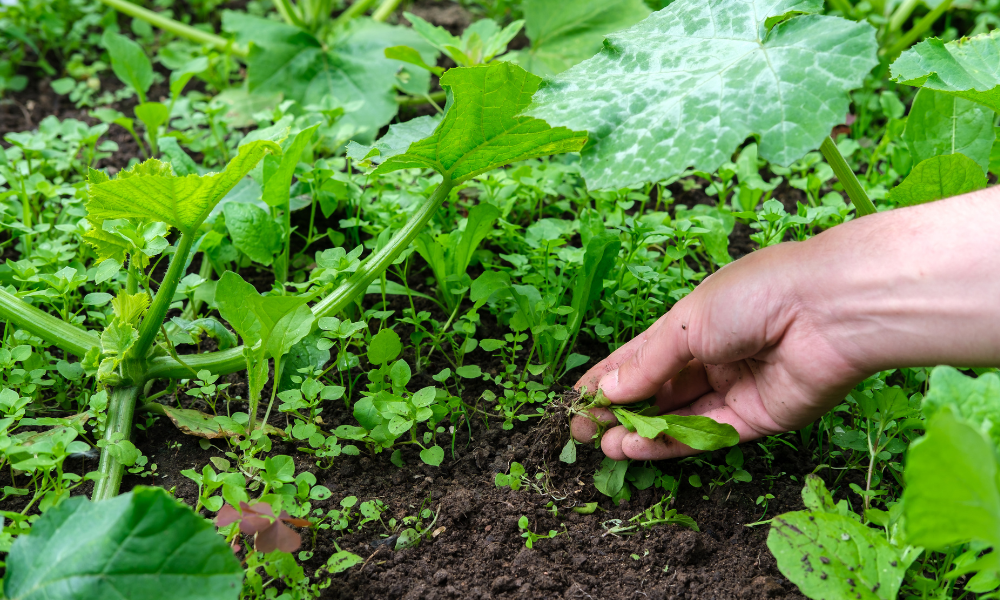
Weeding after rain is a great natural way. Moist soil makes it easier to eradicate weeds, including their roots, limiting regeneration. By eliminating weeds, your plants can thrive without competition.
This approach prevents weed seed distribution, avoiding future infestation. For organic gardens, pulling weeds after rain is environmentally friendly. Enjoy a weed-free garden with this non-toxic method.
12. Controlling weeds by desirable plants:
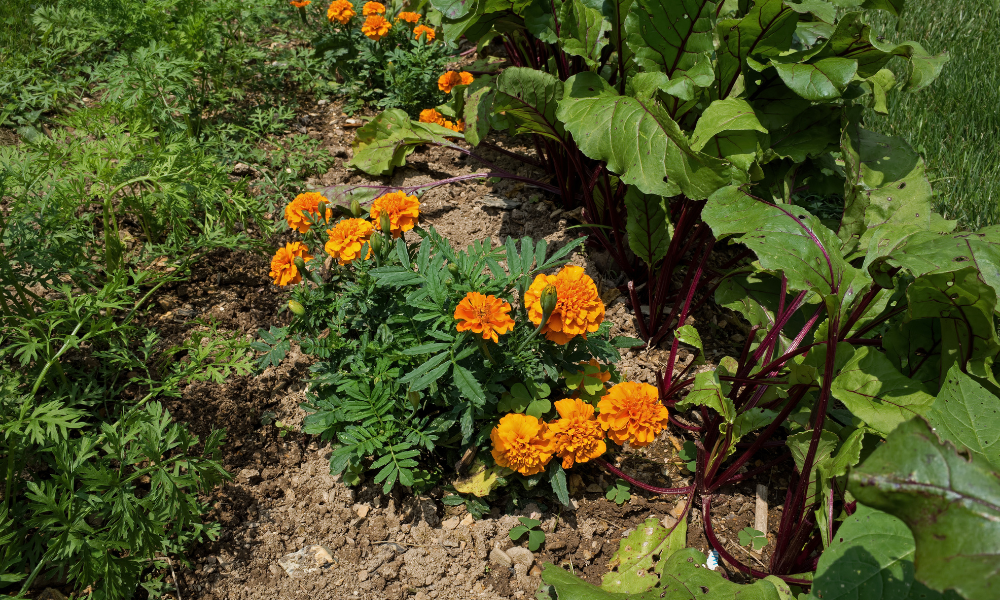
Controlling weeds naturally by using desirable plants is known as companion planting or intercropping. It involves strategically planting desirable plants close together to create a dense and competitive environment that suppresses weed growth.
This method works by providing shade, competing for resources, and attracting beneficial organisms. Companion planting is a sustainable and natural approach to weed management, although it may not completely eliminate weeds.
13. Solarize the soil:
Solarizing soil eliminates weeds, diseases, and unwanted organisms naturally. By covering moist soil with a translucent plastic sheet, sunlight traps heat and kills weed seeds. Solarization is a natural way to reduce weeds, especially in warm, sunny areas.
14. Use a weed torch:

A natural way to control weeds is by using a weed burner. It entails aiming a flame made from gas or propane fuel at weeds in order to kill the plants through thermal shock. This technique works best in bright, dry settings and is useful for young, aggressively developing weeds. This method is very effective in eliminating weed seeds as it completely burn them.
Safety precautions should be followed, and the root systems of weeds might not be entirely destroyed. Perennial weeds may require additional control measures or other treatments after burning them. To reduce the risk of fire, weed torches should only be used carefully.
15. Smothering:
This method of controlling weeds is cost effective. Instead of throwing away cardboard and newspaper, you can use them to solve your weed problems. Just lay down layers of cardboard or wet newspaper sheets on soil surface. Make sure to secure the covering with weights or mulch to ensure weed seeds will not sprout.
16. Organic herbicides:
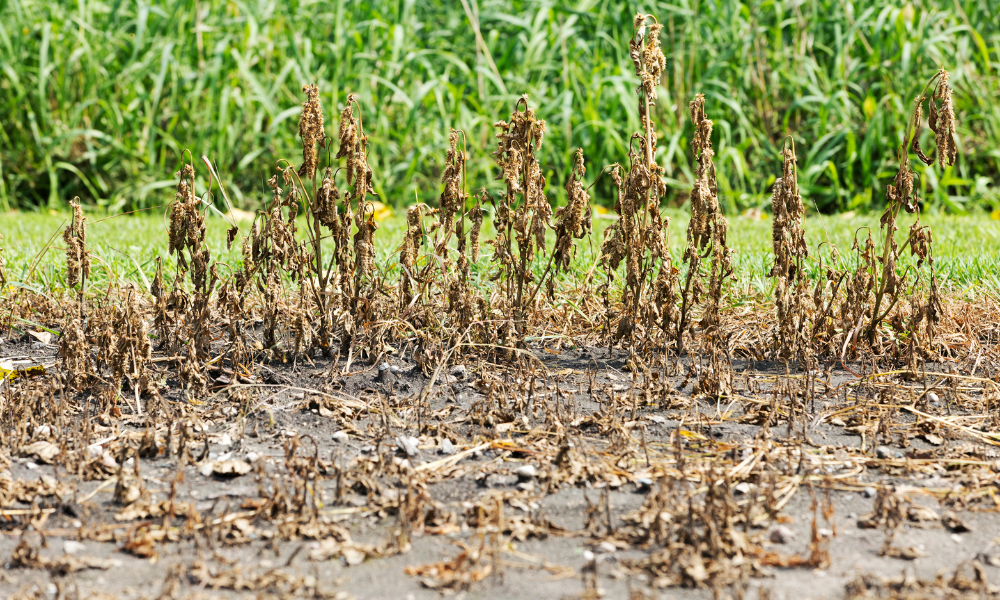
Organic pesticides are natural weed killers. Vinegar, aromatic oils, and corn gluten flour make them. Organic pesticides target weeds without harming the environment or other plants. Compared to systemic herbicides, they are safer, break down faster, and are less harmful. They may require repeated administrations and be less effective and long-lasting. To promote sustainable and eco-friendly procedures, organic herbicides are employed with manual removal and mulching.
17. Cover crops:
Cover crops naturally control weeds. These carefully chosen plants cover and protect the soil from weeds. Cover crops suppress weeds by competing for sunlight, water, and nutrients. Some cover crops suffocate weeds, inhibiting their growth.
Selecting and managing cover crops properly maximizes weed control and crop support benefits. Cover crops support sustainable agriculture and healthy ecosystems.
18. Using Artificial Grass

In a residential lawns you can use artificial grass to control weeds. This lawn weeds control method suppresses and kill weeds, broadleaf weeds and effective in preventing weed germination.
19. Regular maintenance:
Stay on top of your garden and lawn maintenance, including watering, fertilizing or adding soil enhancers. Strong, healthy plants are more resistant to weed invasions. Maintain a healthy lawn by mowing at the appropriate height and edging to prevent weeds from enroaching.
20. Eat the weeds
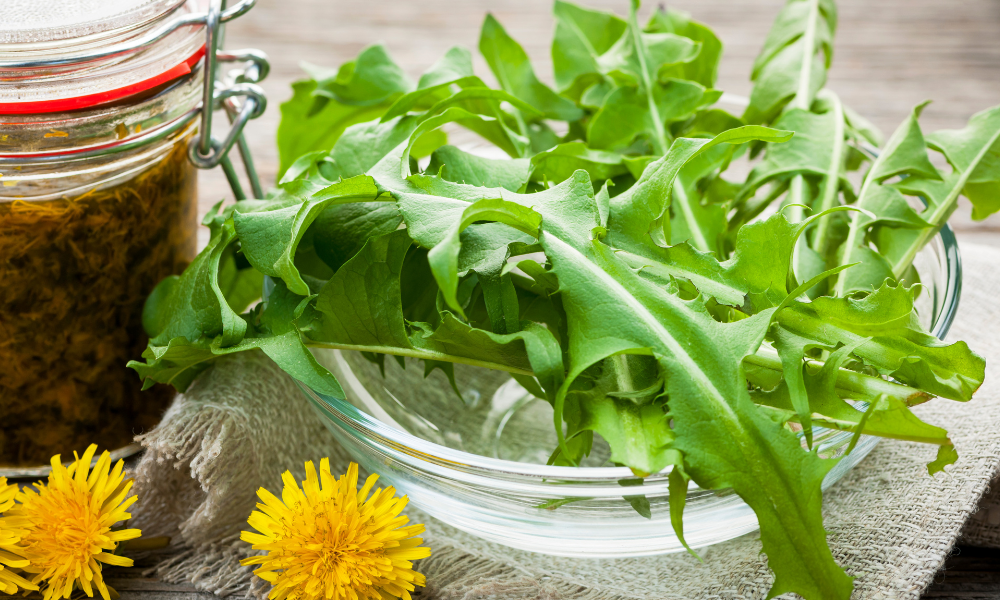
Recent interest has grown in eating edible weeds in order to control weeds naturally. Gardeners and farmers can control weeds development by eating them. But be careful to avoid toxicity, you must identify edible weeds.
Benefits of Using Natural Weed Control
Using natural methods of controlling weeds offers several benefits compared to systemic herbicides or non-selective herbicides. It might take effort but it offers many benefits.
Here are some advantages of opting for natural weed control:
A. Environmental safety:
Natural weed control methods minimize the use of harmful chemicals, reducing the risk of water and soil contamination. They are more environmentally friendly, promoting a healthier ecosystem and protecting beneficial organisms like pollinators and soil microorganisms.
B. Physical and metal health:
Synthetic herbicides often contain toxic ingredients that can pose risks to human health. Natural weed control methods provide a safer alternative, reducing exposure to harmful chemicals for gardeners, pets, and children.
Natural weed control methods provide significant physical and mental health benefits in addition to a beautiful garden. You are not only shaping your garden but also engaged in physical exercise that improves muscles and increases cardiovascular endurance by pulling weeds, hoeing, and digging.
Taking in fresh air and soaking up sunlight while participating in controlling weeds delivers a dose of energizing vitamin D. Furthermore, weeding promotes stress reduction, mindfulness, and mental clarity. By using natural weed control, you are not only nurturing your garden, but also your own well-being.
C. Cost-effective:
Natural weed control is cost-effective. Using cheaper home remedies can save you money on chemical herbicides. You can manage weeds yourself with low-cost tools and DIY methods.
Natural weed killers eliminate the root reasons for weed growth, minimizing the need for ongoing treatments. Organic mulch reduces weeds and nourishes the soil, lowering fertilizer costs.
D. Sustainable weed management:
Natural weed control focuses on long-term solutions rather than quick fixes. Methods like mulching, cover cropping, or proper plant spacing help suppress weeds. It also build healthier soil providing sustainable weed management.
E. Preservation of soil health:
Chemical herbicides can negatively impact soil health by killing beneficial microorganisms and disrupting the natural balance. Natural methods like mulching, hand weeding, or using cover crops maintain soil structure, fertility, and microbial activity.
F. Reduced weed resistance:
Using systemic herbicide requires stronger chemical formulations or alternative methods in the long run. Natural weed control methods work through diverse mechanisms, reducing the development of lawn weed, grassy weeds, or any unwanted weeds.
G. Connect with nature
Natural weed management helps you connect with nature. It's a chance to discover the complex relationship between plants, soil, and insects. Controlling weeds and lawn care is a time to slow down, breathe fresh air, and appreciate nature.
H. Educational value:
Embracing natural weed control allows for a deeper understanding of ecological processes and the interconnectedness of plants, soil, and insects. It encourages learning and experimentation, fostering a closer relationship with nature.
5 Most Common Weeds and How to Control Them Naturally
The five most common weeds can vary depending on the region and climate. However, here are five commonly encountered weeds and natural methods to control them.
Dandelions:
- To control dandelions, you can manually remove them by digging deep to remove the entire taproot. Make sure to remove any flowering heads before they go to seed.
- Mulching your lawn can also help suppress dandelion growth by preventing their seeds from reaching the soil.
- Maintaining a healthy, well-fertilized lawn can help prevent dandelions from taking root.
Crabgrass Weeds
- Regular mowing and keeping your lawn at the recommended height (around 2-3 inches) can help prevent crabgrass growth.
- Maintaining a thick and healthy lawn by proper watering and fertilization can also prevent crabgrass from taking hold.
- Corn gluten meal is an organic pre-emergent herbicide that can inhibit crabgrass seed germination if applied in early spring.
Broadleaf Weeds
- Hand-pulling or digging the broadleaf weeds can effectively remove it. Broadleaf weed control is very effective especially when the soil is moist.
- Maintaining a well-watered lawn and applying organic fertilizers to promote dense turf growth can help prevent broadleaf weeds from establishing.
Common Purslane
- Hand-pulling is an effective method for small infestations of purslane. Ensure you remove the entire plant, including the root.
- Mulching your garden beds can help suppress purslane growth by blocking sunlight and preventing seeds from germinating.
- Improving soil drainage and reducing overwatering can discourage the growth of purslane.
Common Chickweed
- Hand-weeding is effective for chickweed, especially when the soil is moist. Remove the entire plant, including the roots.
- Mulching garden beds can prevent weed seeds from reaching the soil and germinating.
- Promote healthy turf growth in lawns by proper watering, mowing, and fertilization to prevent chickweed invasion.
Conclusion
Remember that weed control is an ongoing process, and it may take multiple attempts and strategies to effectively manage weeds. Additionally, identifying weeds correctly is crucial to applying the appropriate control methods
Note that selective weed killers eliminate weeds without harming beneficial plants nearby. On the other hand nonselective herbicides kills stubborn weeds quickly but will damage all nearby plants, even if they're beneficial. Literally the entire plants they come into contact with. You can use nonselective herbicides in area where there are lots of broadleaf weeds or areas covered with many weedy grasses.
Natural weed control methods may require more effort and regular maintenance compared to chemical alternatives, the benefits they offer to the environment, health, and long-term sustainability make them a valuable choice for weed management.
So get your gloves and start weeding naturally. Let's create a beautiful, healthy, sustainable, and inspiring garden. Happy weeding!





Share and get 15% off!
Simply share this product on one of the following social networks and you will unlock 15% off!